Quality End-of-Life Care Considerations for Individuals with Dementia
VerifiedAdded on 2020/10/22
|6
|1388
|408
AI Summary
The report provides a comprehensive analysis of dementia as a neurological condition that affects memory and cognitive functions, progressing from mild impairment to severe stages such as Alzheimer's disease. The paper highlights how proper nutrition can mitigate the severity of symptoms, emphasizing the importance of family involvement in supporting patients' recovery through encouragement and structured care plans. It discusses the significance of advance care planning for dementia sufferers, ensuring their healthcare preferences are respected when they lose memory capabilities. Moreover, it outlines essential considerations for providing quality end-of-life care tailored to individuals with dementia, including respectful communication by medical staff. Ultimately, the report concludes that a multi-faceted approach involving diet, family support, and careful planning is crucial in managing dementia effectively.
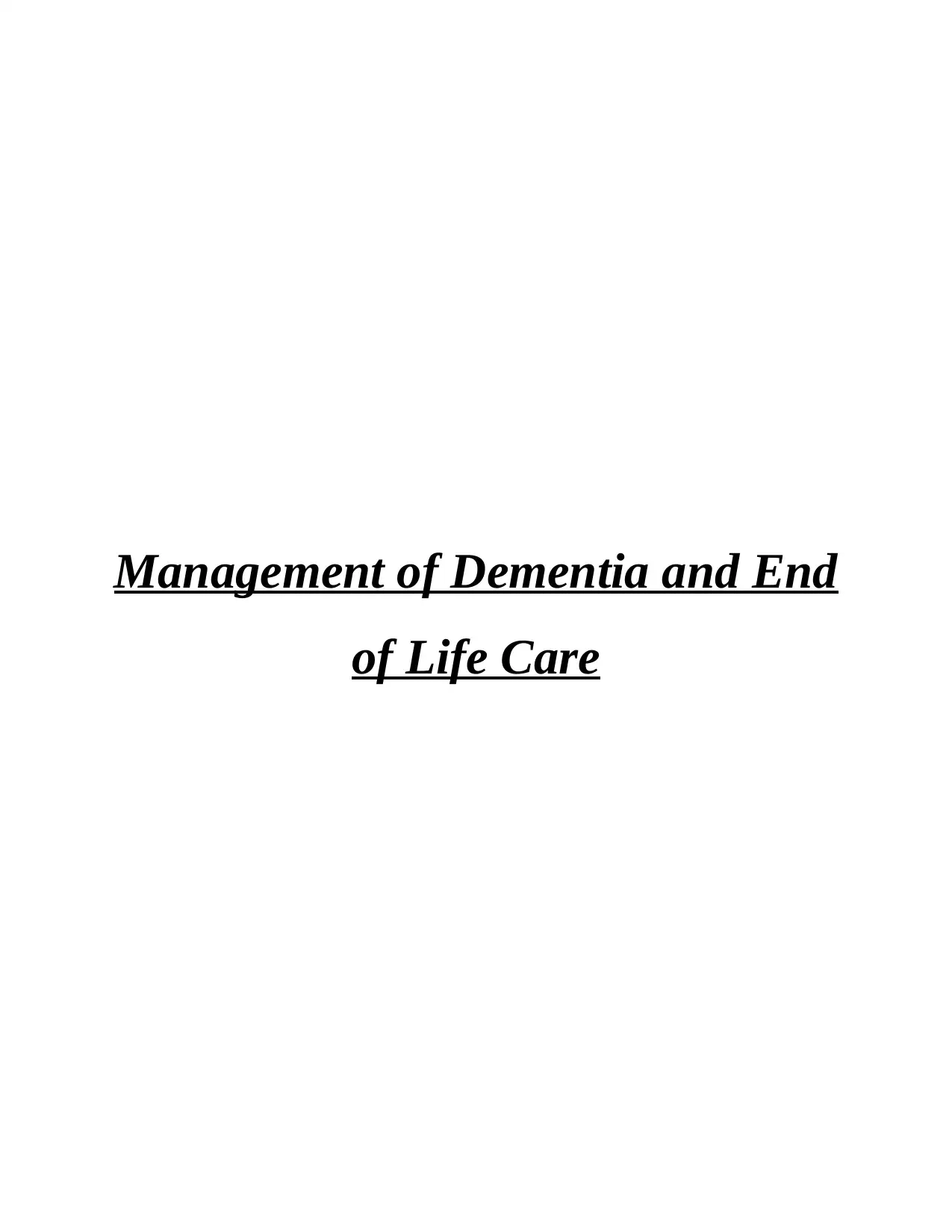
Management of Dementia and End
of Life Care
of Life Care
Paraphrase This Document
Need a fresh take? Get an instant paraphrase of this document with our AI Paraphraser
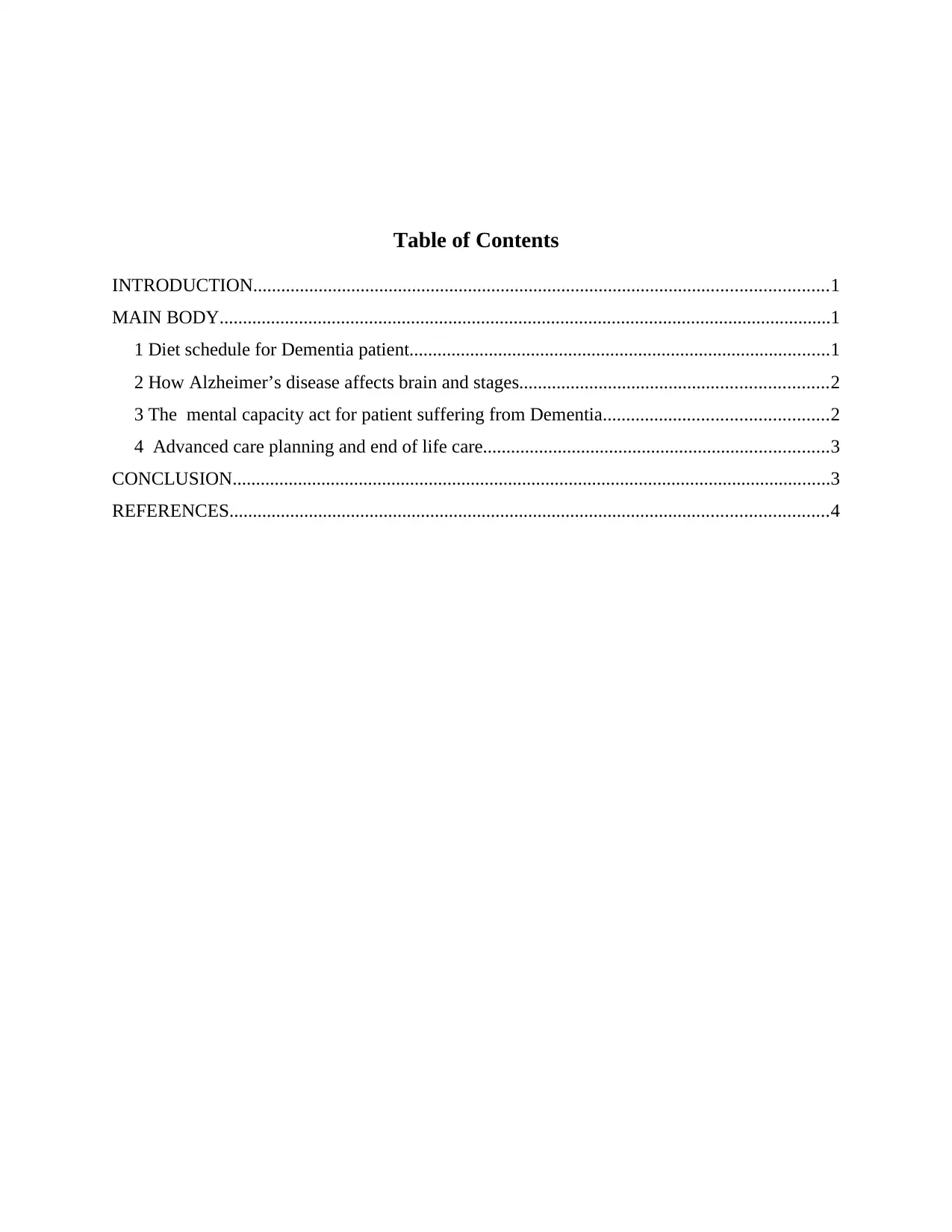
Table of Contents
INTRODUCTION...........................................................................................................................1
MAIN BODY...................................................................................................................................1
1 Diet schedule for Dementia patient..........................................................................................1
2 How Alzheimer’s disease affects brain and stages..................................................................2
3 The mental capacity act for patient suffering from Dementia................................................2
4 Advanced care planning and end of life care..........................................................................3
CONCLUSION................................................................................................................................3
REFERENCES................................................................................................................................4
INTRODUCTION...........................................................................................................................1
MAIN BODY...................................................................................................................................1
1 Diet schedule for Dementia patient..........................................................................................1
2 How Alzheimer’s disease affects brain and stages..................................................................2
3 The mental capacity act for patient suffering from Dementia................................................2
4 Advanced care planning and end of life care..........................................................................3
CONCLUSION................................................................................................................................3
REFERENCES................................................................................................................................4
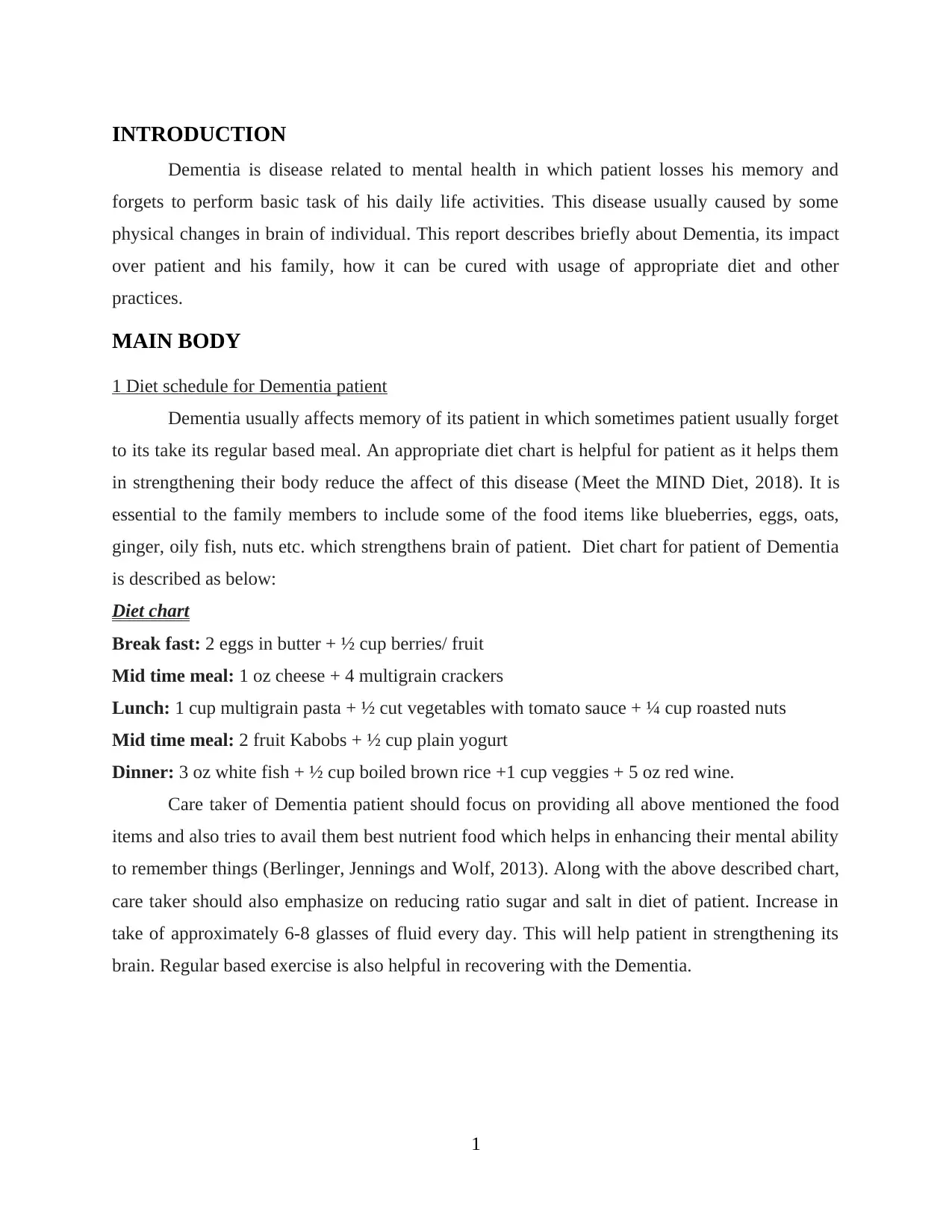
INTRODUCTION
Dementia is disease related to mental health in which patient losses his memory and
forgets to perform basic task of his daily life activities. This disease usually caused by some
physical changes in brain of individual. This report describes briefly about Dementia, its impact
over patient and his family, how it can be cured with usage of appropriate diet and other
practices.
MAIN BODY
1 Diet schedule for Dementia patient
Dementia usually affects memory of its patient in which sometimes patient usually forget
to its take its regular based meal. An appropriate diet chart is helpful for patient as it helps them
in strengthening their body reduce the affect of this disease (Meet the MIND Diet, 2018). It is
essential to the family members to include some of the food items like blueberries, eggs, oats,
ginger, oily fish, nuts etc. which strengthens brain of patient. Diet chart for patient of Dementia
is described as below:
Diet chart
Break fast: 2 eggs in butter + ½ cup berries/ fruit
Mid time meal: 1 oz cheese + 4 multigrain crackers
Lunch: 1 cup multigrain pasta + ½ cut vegetables with tomato sauce + ¼ cup roasted nuts
Mid time meal: 2 fruit Kabobs + ½ cup plain yogurt
Dinner: 3 oz white fish + ½ cup boiled brown rice +1 cup veggies + 5 oz red wine.
Care taker of Dementia patient should focus on providing all above mentioned the food
items and also tries to avail them best nutrient food which helps in enhancing their mental ability
to remember things (Berlinger, Jennings and Wolf, 2013). Along with the above described chart,
care taker should also emphasize on reducing ratio sugar and salt in diet of patient. Increase in
take of approximately 6-8 glasses of fluid every day. This will help patient in strengthening its
brain. Regular based exercise is also helpful in recovering with the Dementia.
1
Dementia is disease related to mental health in which patient losses his memory and
forgets to perform basic task of his daily life activities. This disease usually caused by some
physical changes in brain of individual. This report describes briefly about Dementia, its impact
over patient and his family, how it can be cured with usage of appropriate diet and other
practices.
MAIN BODY
1 Diet schedule for Dementia patient
Dementia usually affects memory of its patient in which sometimes patient usually forget
to its take its regular based meal. An appropriate diet chart is helpful for patient as it helps them
in strengthening their body reduce the affect of this disease (Meet the MIND Diet, 2018). It is
essential to the family members to include some of the food items like blueberries, eggs, oats,
ginger, oily fish, nuts etc. which strengthens brain of patient. Diet chart for patient of Dementia
is described as below:
Diet chart
Break fast: 2 eggs in butter + ½ cup berries/ fruit
Mid time meal: 1 oz cheese + 4 multigrain crackers
Lunch: 1 cup multigrain pasta + ½ cut vegetables with tomato sauce + ¼ cup roasted nuts
Mid time meal: 2 fruit Kabobs + ½ cup plain yogurt
Dinner: 3 oz white fish + ½ cup boiled brown rice +1 cup veggies + 5 oz red wine.
Care taker of Dementia patient should focus on providing all above mentioned the food
items and also tries to avail them best nutrient food which helps in enhancing their mental ability
to remember things (Berlinger, Jennings and Wolf, 2013). Along with the above described chart,
care taker should also emphasize on reducing ratio sugar and salt in diet of patient. Increase in
take of approximately 6-8 glasses of fluid every day. This will help patient in strengthening its
brain. Regular based exercise is also helpful in recovering with the Dementia.
1
⊘ This is a preview!⊘
Do you want full access?
Subscribe today to unlock all pages.

Trusted by 1+ million students worldwide
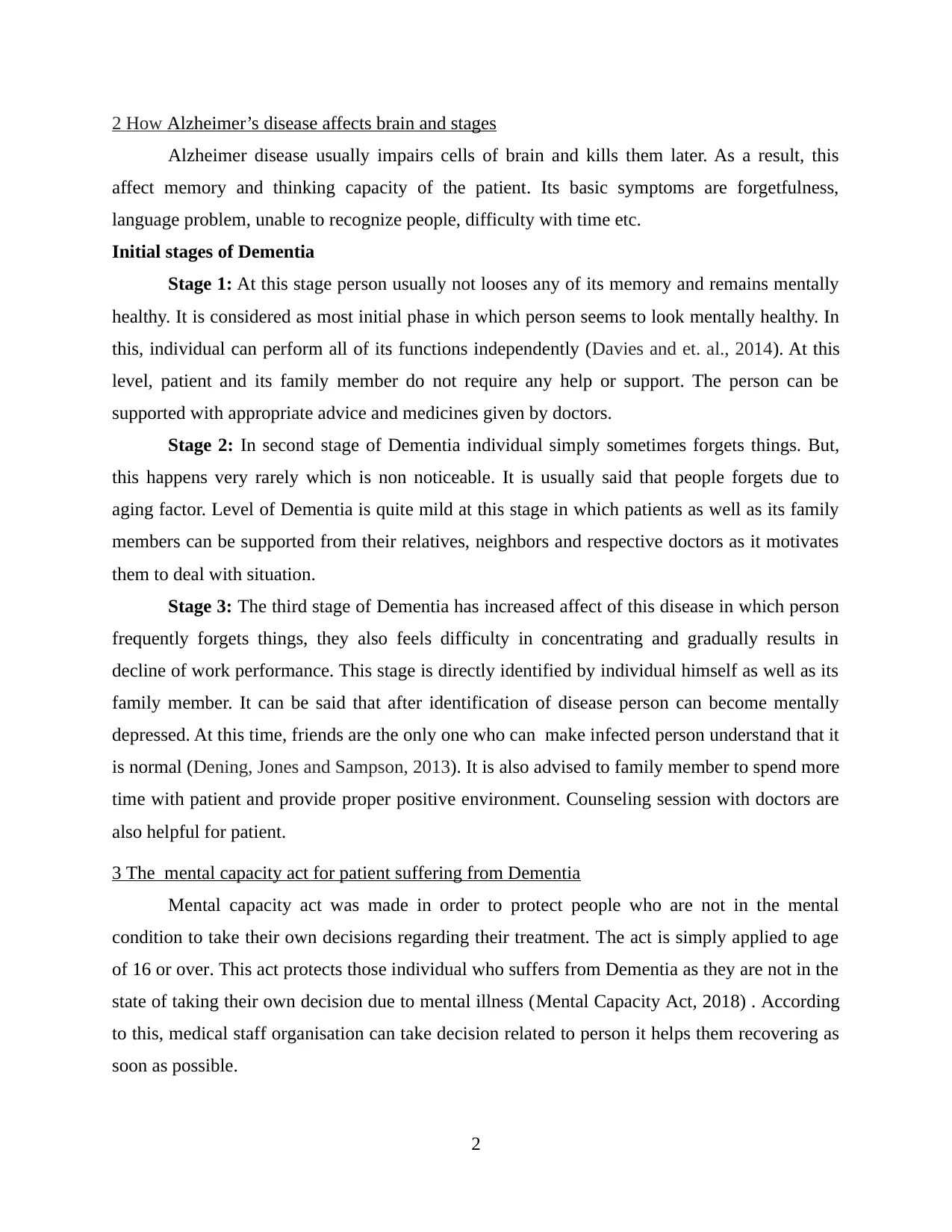
2 How Alzheimer’s disease affects brain and stages
Alzheimer disease usually impairs cells of brain and kills them later. As a result, this
affect memory and thinking capacity of the patient. Its basic symptoms are forgetfulness,
language problem, unable to recognize people, difficulty with time etc.
Initial stages of Dementia
Stage 1: At this stage person usually not looses any of its memory and remains mentally
healthy. It is considered as most initial phase in which person seems to look mentally healthy. In
this, individual can perform all of its functions independently (Davies and et. al., 2014). At this
level, patient and its family member do not require any help or support. The person can be
supported with appropriate advice and medicines given by doctors.
Stage 2: In second stage of Dementia individual simply sometimes forgets things. But,
this happens very rarely which is non noticeable. It is usually said that people forgets due to
aging factor. Level of Dementia is quite mild at this stage in which patients as well as its family
members can be supported from their relatives, neighbors and respective doctors as it motivates
them to deal with situation.
Stage 3: The third stage of Dementia has increased affect of this disease in which person
frequently forgets things, they also feels difficulty in concentrating and gradually results in
decline of work performance. This stage is directly identified by individual himself as well as its
family member. It can be said that after identification of disease person can become mentally
depressed. At this time, friends are the only one who can make infected person understand that it
is normal (Dening, Jones and Sampson, 2013). It is also advised to family member to spend more
time with patient and provide proper positive environment. Counseling session with doctors are
also helpful for patient.
3 The mental capacity act for patient suffering from Dementia
Mental capacity act was made in order to protect people who are not in the mental
condition to take their own decisions regarding their treatment. The act is simply applied to age
of 16 or over. This act protects those individual who suffers from Dementia as they are not in the
state of taking their own decision due to mental illness (Mental Capacity Act, 2018) . According
to this, medical staff organisation can take decision related to person it helps them recovering as
soon as possible.
2
Alzheimer disease usually impairs cells of brain and kills them later. As a result, this
affect memory and thinking capacity of the patient. Its basic symptoms are forgetfulness,
language problem, unable to recognize people, difficulty with time etc.
Initial stages of Dementia
Stage 1: At this stage person usually not looses any of its memory and remains mentally
healthy. It is considered as most initial phase in which person seems to look mentally healthy. In
this, individual can perform all of its functions independently (Davies and et. al., 2014). At this
level, patient and its family member do not require any help or support. The person can be
supported with appropriate advice and medicines given by doctors.
Stage 2: In second stage of Dementia individual simply sometimes forgets things. But,
this happens very rarely which is non noticeable. It is usually said that people forgets due to
aging factor. Level of Dementia is quite mild at this stage in which patients as well as its family
members can be supported from their relatives, neighbors and respective doctors as it motivates
them to deal with situation.
Stage 3: The third stage of Dementia has increased affect of this disease in which person
frequently forgets things, they also feels difficulty in concentrating and gradually results in
decline of work performance. This stage is directly identified by individual himself as well as its
family member. It can be said that after identification of disease person can become mentally
depressed. At this time, friends are the only one who can make infected person understand that it
is normal (Dening, Jones and Sampson, 2013). It is also advised to family member to spend more
time with patient and provide proper positive environment. Counseling session with doctors are
also helpful for patient.
3 The mental capacity act for patient suffering from Dementia
Mental capacity act was made in order to protect people who are not in the mental
condition to take their own decisions regarding their treatment. The act is simply applied to age
of 16 or over. This act protects those individual who suffers from Dementia as they are not in the
state of taking their own decision due to mental illness (Mental Capacity Act, 2018) . According
to this, medical staff organisation can take decision related to person it helps them recovering as
soon as possible.
2
Paraphrase This Document
Need a fresh take? Get an instant paraphrase of this document with our AI Paraphraser
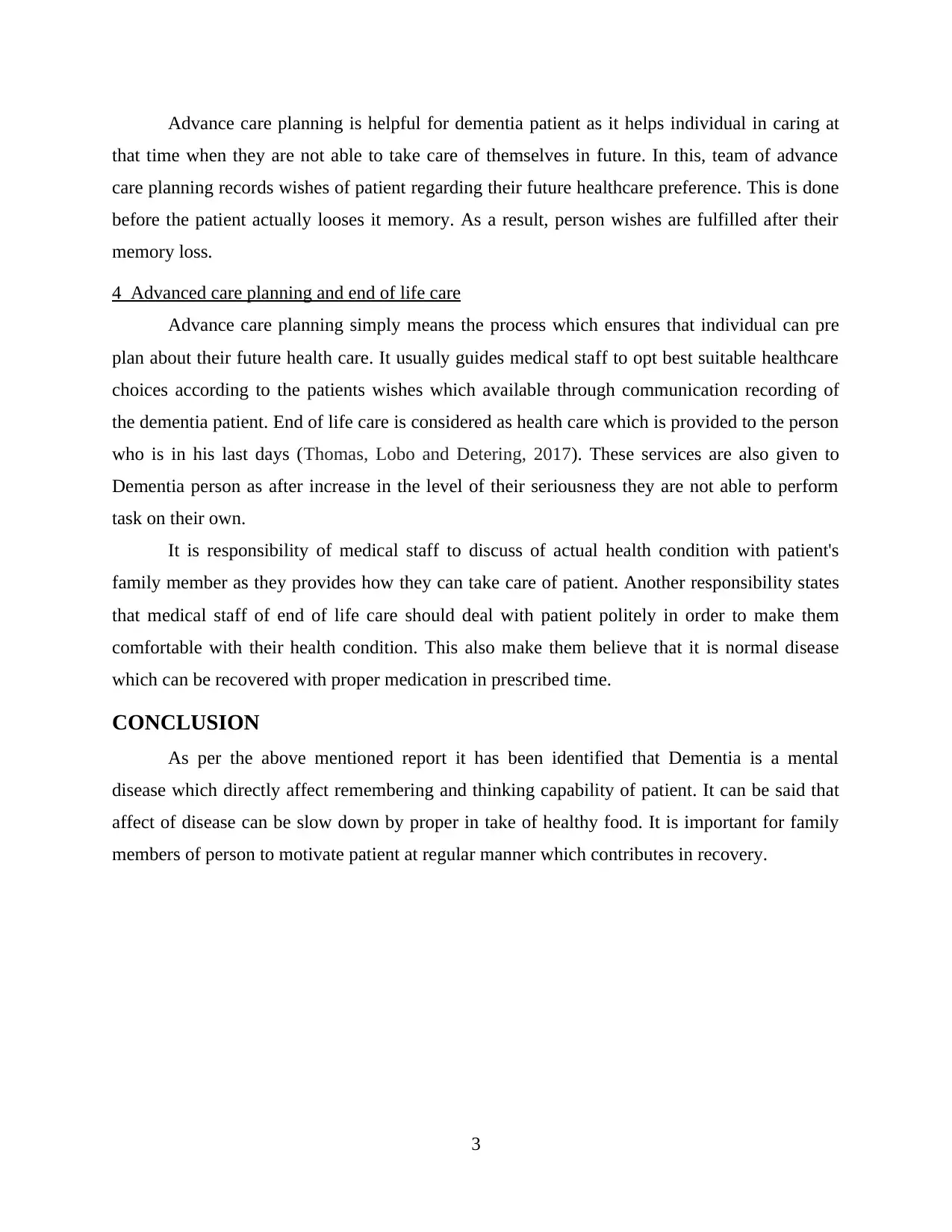
Advance care planning is helpful for dementia patient as it helps individual in caring at
that time when they are not able to take care of themselves in future. In this, team of advance
care planning records wishes of patient regarding their future healthcare preference. This is done
before the patient actually looses it memory. As a result, person wishes are fulfilled after their
memory loss.
4 Advanced care planning and end of life care
Advance care planning simply means the process which ensures that individual can pre
plan about their future health care. It usually guides medical staff to opt best suitable healthcare
choices according to the patients wishes which available through communication recording of
the dementia patient. End of life care is considered as health care which is provided to the person
who is in his last days (Thomas, Lobo and Detering, 2017). These services are also given to
Dementia person as after increase in the level of their seriousness they are not able to perform
task on their own.
It is responsibility of medical staff to discuss of actual health condition with patient's
family member as they provides how they can take care of patient. Another responsibility states
that medical staff of end of life care should deal with patient politely in order to make them
comfortable with their health condition. This also make them believe that it is normal disease
which can be recovered with proper medication in prescribed time.
CONCLUSION
As per the above mentioned report it has been identified that Dementia is a mental
disease which directly affect remembering and thinking capability of patient. It can be said that
affect of disease can be slow down by proper in take of healthy food. It is important for family
members of person to motivate patient at regular manner which contributes in recovery.
3
that time when they are not able to take care of themselves in future. In this, team of advance
care planning records wishes of patient regarding their future healthcare preference. This is done
before the patient actually looses it memory. As a result, person wishes are fulfilled after their
memory loss.
4 Advanced care planning and end of life care
Advance care planning simply means the process which ensures that individual can pre
plan about their future health care. It usually guides medical staff to opt best suitable healthcare
choices according to the patients wishes which available through communication recording of
the dementia patient. End of life care is considered as health care which is provided to the person
who is in his last days (Thomas, Lobo and Detering, 2017). These services are also given to
Dementia person as after increase in the level of their seriousness they are not able to perform
task on their own.
It is responsibility of medical staff to discuss of actual health condition with patient's
family member as they provides how they can take care of patient. Another responsibility states
that medical staff of end of life care should deal with patient politely in order to make them
comfortable with their health condition. This also make them believe that it is normal disease
which can be recovered with proper medication in prescribed time.
CONCLUSION
As per the above mentioned report it has been identified that Dementia is a mental
disease which directly affect remembering and thinking capability of patient. It can be said that
affect of disease can be slow down by proper in take of healthy food. It is important for family
members of person to motivate patient at regular manner which contributes in recovery.
3
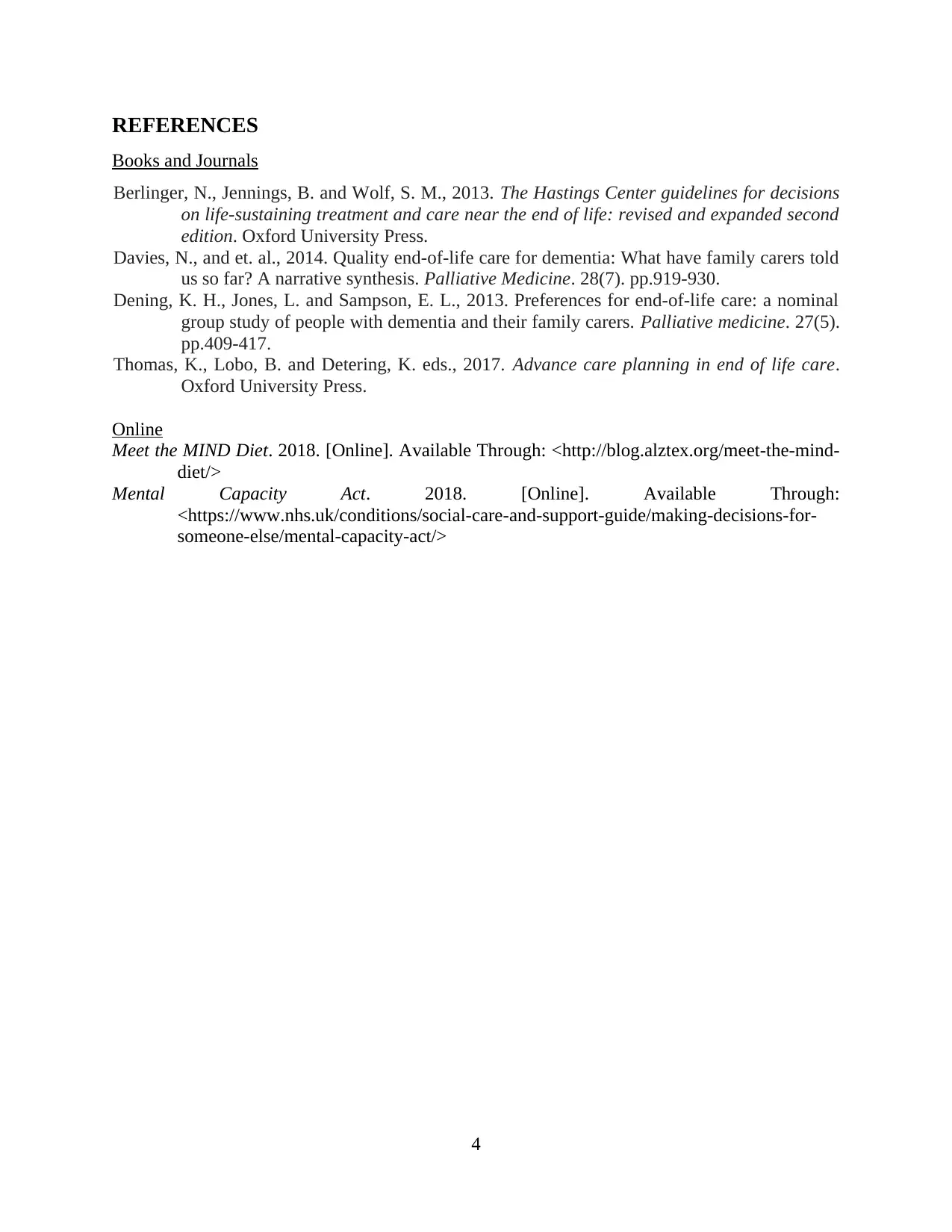
REFERENCES
Books and Journals
Berlinger, N., Jennings, B. and Wolf, S. M., 2013. The Hastings Center guidelines for decisions
on life-sustaining treatment and care near the end of life: revised and expanded second
edition. Oxford University Press.
Davies, N., and et. al., 2014. Quality end-of-life care for dementia: What have family carers told
us so far? A narrative synthesis. Palliative Medicine. 28(7). pp.919-930.
Dening, K. H., Jones, L. and Sampson, E. L., 2013. Preferences for end-of-life care: a nominal
group study of people with dementia and their family carers. Palliative medicine. 27(5).
pp.409-417.
Thomas, K., Lobo, B. and Detering, K. eds., 2017. Advance care planning in end of life care.
Oxford University Press.
Online
Meet the MIND Diet. 2018. [Online]. Available Through: <http://blog.alztex.org/meet-the-mind-
diet/>
Mental Capacity Act. 2018. [Online]. Available Through:
<https://www.nhs.uk/conditions/social-care-and-support-guide/making-decisions-for-
someone-else/mental-capacity-act/>
4
Books and Journals
Berlinger, N., Jennings, B. and Wolf, S. M., 2013. The Hastings Center guidelines for decisions
on life-sustaining treatment and care near the end of life: revised and expanded second
edition. Oxford University Press.
Davies, N., and et. al., 2014. Quality end-of-life care for dementia: What have family carers told
us so far? A narrative synthesis. Palliative Medicine. 28(7). pp.919-930.
Dening, K. H., Jones, L. and Sampson, E. L., 2013. Preferences for end-of-life care: a nominal
group study of people with dementia and their family carers. Palliative medicine. 27(5).
pp.409-417.
Thomas, K., Lobo, B. and Detering, K. eds., 2017. Advance care planning in end of life care.
Oxford University Press.
Online
Meet the MIND Diet. 2018. [Online]. Available Through: <http://blog.alztex.org/meet-the-mind-
diet/>
Mental Capacity Act. 2018. [Online]. Available Through:
<https://www.nhs.uk/conditions/social-care-and-support-guide/making-decisions-for-
someone-else/mental-capacity-act/>
4
⊘ This is a preview!⊘
Do you want full access?
Subscribe today to unlock all pages.

Trusted by 1+ million students worldwide
1 out of 6
Related Documents
Your All-in-One AI-Powered Toolkit for Academic Success.
+13062052269
info@desklib.com
Available 24*7 on WhatsApp / Email
![[object Object]](/_next/static/media/star-bottom.7253800d.svg)
Unlock your academic potential
Copyright © 2020–2026 A2Z Services. All Rights Reserved. Developed and managed by ZUCOL.




